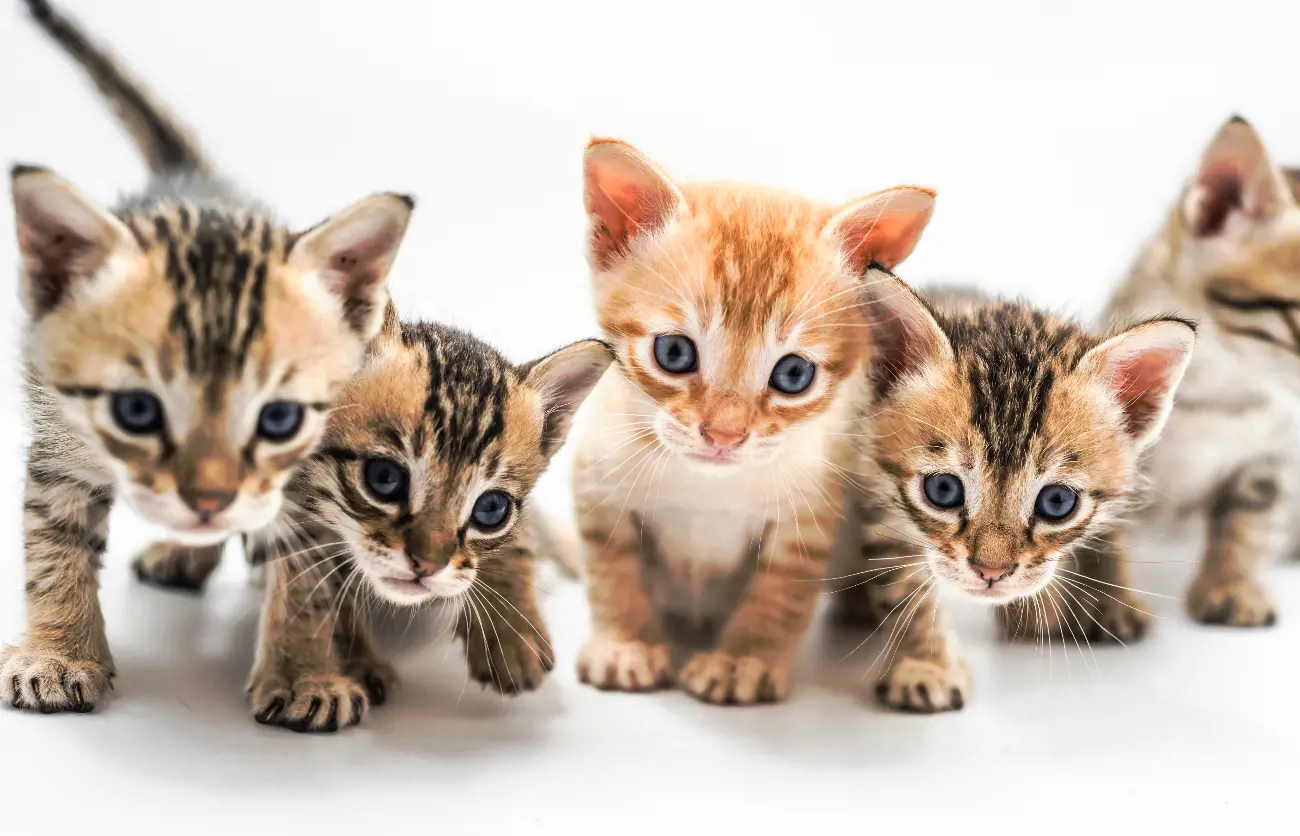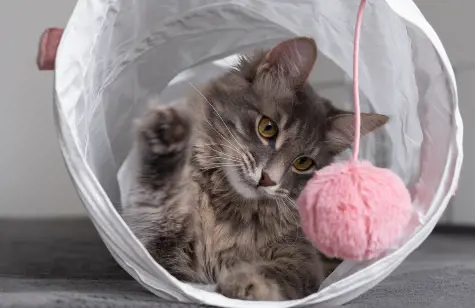Can cats see in the dark? Interesting night vision facts
22nd May, 2023
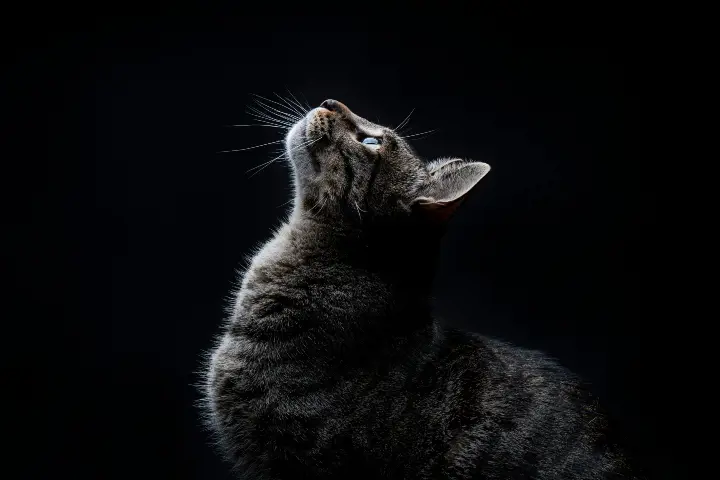
You might struggle to see at night without a torch, but how well does your mog see in the dark? Learn how your feline sees the world and what makes their vision so special.
You’re sleeping soundly, hoping to catch up on your beauty sleep before another day at the office when ‘crash!’ Oh no, seems like your beloved Tom has knocked over another vase in the early morning hours! Sound familiar?
Or maybe you’re no stranger to finding the odd sock or – dare we say it – mouse lying on your doormat when you get up. Eek!
Whatever the case, it seems like your forever-napping daytime feline turns into the ultimate night prowler as soon as the lights go off. Don’t worry, they’re not a vampire, but they are crepuscular. What’s that? It means they’re more active during dawn and dusk.
So, can your twilight-loving kitty really see that well in the dark? Discover how much your mog can actually see and how cat health insurance can help you look after their vision throughout their lifetime.
5 quick facts about cats’ eyes
Before we jump into more details about how well your pet can see at night, let’s look at some quick, fun facts about their peepers.
1. Felines are green and red colour blind
As humans, we have three types of colour receptors, allowing us to see a host of rainbow shades. Cats only have two receptors, which means green and red look grey to them.
That doesn’t mean they see the world in black and white, though. They can spot yellow and blue and are especially sensitive to brightness.
2. They are mid sighted
You’ve heard of near and far-sighted, right? But what’s in the middle? Well, because they don’t have the muscles needed to change their eye’s shape, cats can’t focus on close objects.
Make way for another super sense – whiskers! Place something right in front of your kitty’s nose, and they won’t be able to see it, but they can use their whiskers to tell it’s there.
They’re also not that great at seeing something very far away either. While our vision is super sharp between 100-200 feet, a cat’s is best at no more than 20 feet.
3. A cat’s peripheral vision is excellent
One of the reasons your cat is such a great hunter is their wide field of vision, helping them spot when something moves nearby. Your pet can see an impressive 30 degrees on each side while we can only see 20 degrees.
4. They are very sensitive to movement
It’s not only their extensive peripheral vision that helps them catch their prey – they are also a lot more sensitive to movement than us. That’s why they’re so good at grabbing hold of that fishing toy you love to wave around!
5. Cats are great at seeing at night
With such a keen eye, it’s no surprise that their night-vision is also excellent. They aren’t nocturnal, so can’t see in the pitch black, but they can see well with just a bit of moonlight. They have no problem enjoying a run around your house while everyone else is in the land of nod!
Your feline friend’s vision is important to its quality of life, and if you notice they are less active than normal or are looking blankly into space, it’s time to call your vet.
Vision impairment and blindness become more likely as your cat ages, and they’ll need your help to remain happy and comfortable.
Struggling to find protection for your senior mog? Here at Purely Pets, we have no upper age limit when it comes to cat health insurance, so get in touch today to cover your old cat.
Can cats see better in the dark than humans?
So, after reading about how incredible cats' eyes are, you’re probably willing to bet that they can see much better than us at night – and you’d be right!
- Let’s compare cats vs. humans when it comes to night-vision and see what makes our feline friends’ sight so superior:
- Cats have more rods in their retinas while we have more cones. This difference means we can see better in colour, but they have the upper-hand at night.
- The fact your kitty sees less colour is beneficial during dawn and dusk.
- Your feline’s slit pupils are much more effective at responding to how light enters their eyes than our rounder versions.
- Ever noticed your pet’s eyes seem to shine when it’s dark? That’s thanks to a thin, reflective layer at the back of their eye that magnifies light in darkness.
For cat health insurance to treat your feline’s eyes in an emergency, choose an award-winning lifetime plan from Purely Pets. We offer 15 levels of cover to suit every cat and its owner, so you can help your feisty feline see in the dark for years to come.
What do cats see?
You now know that your cat’s eyesight is quite a bit different to yours, but what does the world look like to your beloved mog?
Your cat’s peripheral vision is much more advanced, but they see less colour and those that they do detect aren’t as rich. The images at night also demonstrate how your feline’s eyes reflect light differently and make twilight seem less dark.
Want to know more? We’ve got plenty more where that came from in our article on what cats see.
Do cats need a light on at night?
Got a cat that does all their playing at night? You might be tempted to leave a light on for them, but you could be doing more harm than good, especially if you’ve got a new kitten at home.
With constant light throughout the night, your pet will find it hard to develop a sleeping pattern, leading to more disturbances for you. Is your pet not letting you snooze? Check out our article on how to stop your cat waking you up.
That doesn’t mean it needs to be pitch black, though. Remember, like us, your cat also finds it hard to navigate in total darkness, and it could also cause issues like:
Your cat becoming overly stressed because they can’t see.
Your pet finding it hard to reach its litter box or water bowl.
You tripping over your kitty because you couldn’t see it!
For the perfect night time environment, leave a dim light on or your curtains ajar. Your cat will be able to see and it won’t disrupt your dreams.
Should I leave a TV on for a cat?
No – just like lots of light, leaving the TV on could make your cat think it’s time to play and that everyone feels the same. And that’s not to mention the huge electric bill you’ll rack up!
Signs your cat is losing their vision
As we age, we start to feel more aches and pains than we used to, and many of us experience some form of vision impairment. It’s the same for your mog. So, how can you tell your cats’ eyes aren’t what they used to be so you can help them navigate their new world?
It’s not always easy to spot differences in a cat, especially if they go blind gradually, but keep an eye out for these symptoms:
- Very wide pupils
- Uneven pupils
- Cloudiness
- Walking slowly/more cautiously
- Disorientation and bumping into things
- Hiding and becoming less social
- Reluctance to jump or go out at night
- Nervous and flinching when touched
Causes of cat blindness
There are lots of reasons why your mog can’t see anymore. Some cause sudden blindness while others happen gradually, allowing your cat to adapt to its condition. Here are some of the most common:
- Optic neuritis: This disease is rare but happens when your mog’s optic nerves become inflamed and no longer work as they should.
- Hypertension: According to International Cat Care, high blood pressure is one of the most common issues leading to acute onset blindness. Hypertension causes damage to the back of the eye’s small blood vessels, which can, in turn, lead to retinal detachment and blindness.
- Retinal degeneration: With age, cats can suffer degeneration in the back of the eye, which is the part responsible for what we see. It’s usually a slow process but can be sudden. Don’t forget to protect your senior mog with one of our cat health insurance plans for older pets.
- Brain diseases: A host of complications in the brain can cause blindness, including infections, inflammation, strokes and tumours.
- Glaucoma: This condition usually starts with a fluid build-up at the front of the eye, causing pressure and damaging the optic nerve. If spotted early, glaucoma is treatable.
- Anaesthetic complications: Although extremely rare, complications while your pet is under anaesthetic can lead to blindness.
- Eye injury: Got a cat that likes to prowl the neighbourhood? If they get into a fight, it’s not uncommon to suffer an eye injury.
- Cataracts: Affecting the lens, this medical concern causes cloudy patches to develop, which grow over time and make your cat’s vision misty and blurred, eventually leading to blindness.
As some of these causes are reversible or at least manageable, it’s important you get your cat to the vet as soon as you spot something’s wrong.
Don't forget to get cat health insurance the moment they become a part of your family and before any noticeable signs of illness develop. This way, you’ll be able to get them the care and support they need in an emergency without having to worry about vet bills.
Are other senses heightened in cats?
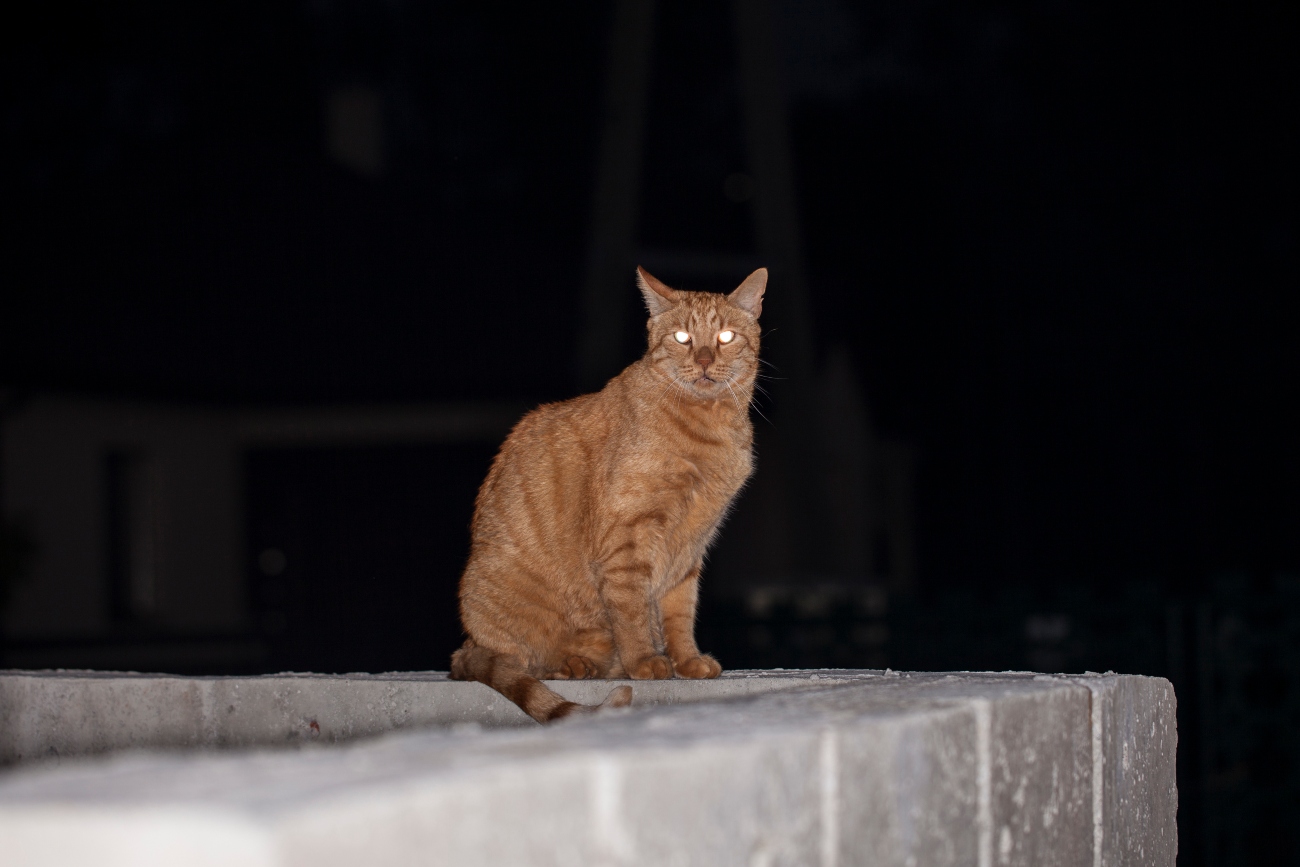
Does it seem like your cat doesn’t miss a thing? That’s because it’s not only their eyes that make them super sleuths! Here’s a quick rundown of some of their other seriously superior senses – and one where we actually come out on top!
Does it seem like your cat doesn’t miss a thing? That’s because it’s not only their eyes that make them super sleuths! Here’s a quick rundown of some of their other seriously superior senses – and one where we actually come out on top!
Hearing
Thought your dog was the best at hearing in your house? Think again! Your beloved kitty can hear even better, thanks to their satellite dish shaped ears.
Let’s put things into perspective – we measure sound in vibrations, and the frequency of vibrations per second is called hertz. So, how do we fare against our four-legged counterparts?
- Humans hear 20,000 hertz. Sounds pretty high, doesn’t it?
- Dogs have a range of 35,000-40,000 hertz. Wow, double humans!
- Cats can hear 100,000 hertz! We have a clear winner!
Felines are incredible listeners, but how can you tell they’re having trouble picking up sounds like they used to? According to Cats Protection, you should watch for the following:
- Doesn't respond when called
- Easily startled
- Dizzy and disoriented
- No longer frightened of loud noises
- Shaking their head
- Pus or bad odour coming from their ears
We understand that it’s not nice to think about your cat’s ears failing, but you never know when it might happen due to a genetic condition, an accident or severe illness.
That’s why it’s always important to protect your pet with cat health insurance from the moment you make them a part of your family. Remember, pet insurance won’t cover you for pre-existing conditions.
Smell
Got a cat that always turns up while you’re cooking? Your feline’s nose is extremely sensitive, and their sense of smell can help them find crumbs under your fridge or even a mouse lurking in a dark corner!
How do they compare to us? We have 5 million smell cells (which sounds impressive), but cats have 200 million! They beat their canine companions, too, who tend to have around 100 million cells.
They also use their olfactory sense to communicate. How? In your pet’s head and paws are tiny scent glands, which is why you can often see them rubbing their noses on things, including you, letting other felines know where they’ve been.
Touch
Remember we mentioned whiskers earlier? Well, these long and fine apparatus are vital to your cat’s sense of touch, and they’re not only found on their face – your moggy has whiskers on the backs of their front legs, too.
Ever wondered why they have them? They work like an antenna, allowing your kitty to judge whether a space is too small or narrow to fit through. This is ideal for curious cats who might otherwise get into a tight situation they can’t get out of!
Did you know you can also read your pet’s whiskers to tell how they’re feeling? Read all about cat body language elsewhere on our site.
Taste
It’s no secret that cats can be rather picky when it comes to dinner time, but there's a reason for this finicky behaviour. Your feline only has 473 taste buds compared to our 9,000, which is why they rely so much on their superb sense of smell.
Finally, a win for the humans! But with sight, smell, touch and hearing all going to our feline friends, they come out on top 4-1.
If you ever notice something not quite right with any one of your moggy’s senses, give your vet a call. Got cat health insurance with Purely Pets? Use our 24-hour vet video service to get professional advice fast.
What are cats scared of?
With their superhero senses and no-fear attitude at jumping up to six times their height, you might think your cat’s not afraid of anything. Add to that their natural instinct to hide pain and other feelings, and they seem like the bravest creatures on the planet!
But the phrase ‘scaredy-cat’ doesn’t come from nothing. Despite their hard front, it’s also common to see your kitty jump at sudden noises or flee the room at the first sign of a stranger entering your home.
To avoid a fearful heart attack and having to claim on your cat health insurance, it’s a good idea to minimise these frights. So, what causes this jumpy behaviour in cats?
Here's what they're afraid of:
- Loud noises - Thunder and fireworks (we've got tips to keep your pet calm) are two of the biggest culprits here, but there’s also a lot of common household appliances that are equally frightening. Washing machines, blenders, hairdryers and vacuum cleaners can all send your cat darting off.
- Mirrors - Not all cats are afraid of mirrors, but many don’t recognise themselves and jump as a result. Don’t be surprised if your mog claws at your mirror or runs off as soon as they get a glimpse of their reflection.
- Leaving home - Does your cat go stiff whenever you head to the vet or a cattery? As territorial creatures, unfamiliar sounds and surroundings are enough to give them the heebie jeebies.
- Other pets - If your animals have lived for years together, they usually get along (or at least tolerate each other). But when a new pet comes home, your mog might see them as a threat and become hostile. Introduce new cats and dogs slowly for the best results.
- Changes at home - Has your pet been acting odd since you got a new sofa? Even for cats who once loved curling up in the corner, new furniture brings new smells, so it can take time for them to get used to it.
- New people - Don’t worry if your feisty feline leaves the room or flinches when someone new visits your home. It’s natural for them to act slightly cautious.
- Water - If your cat had it their way, they’d go their whole life without dipping a paw in water. It dampens their scent, spoiling their grooming efforts, and makes them feel cold and heavy. So, proceed with caution if you need to give them a bath! Not all breeds hate getting wet, though – Bengals and Turkish Vans are big fans.
Get cat health insurance to protect your night-vision mog
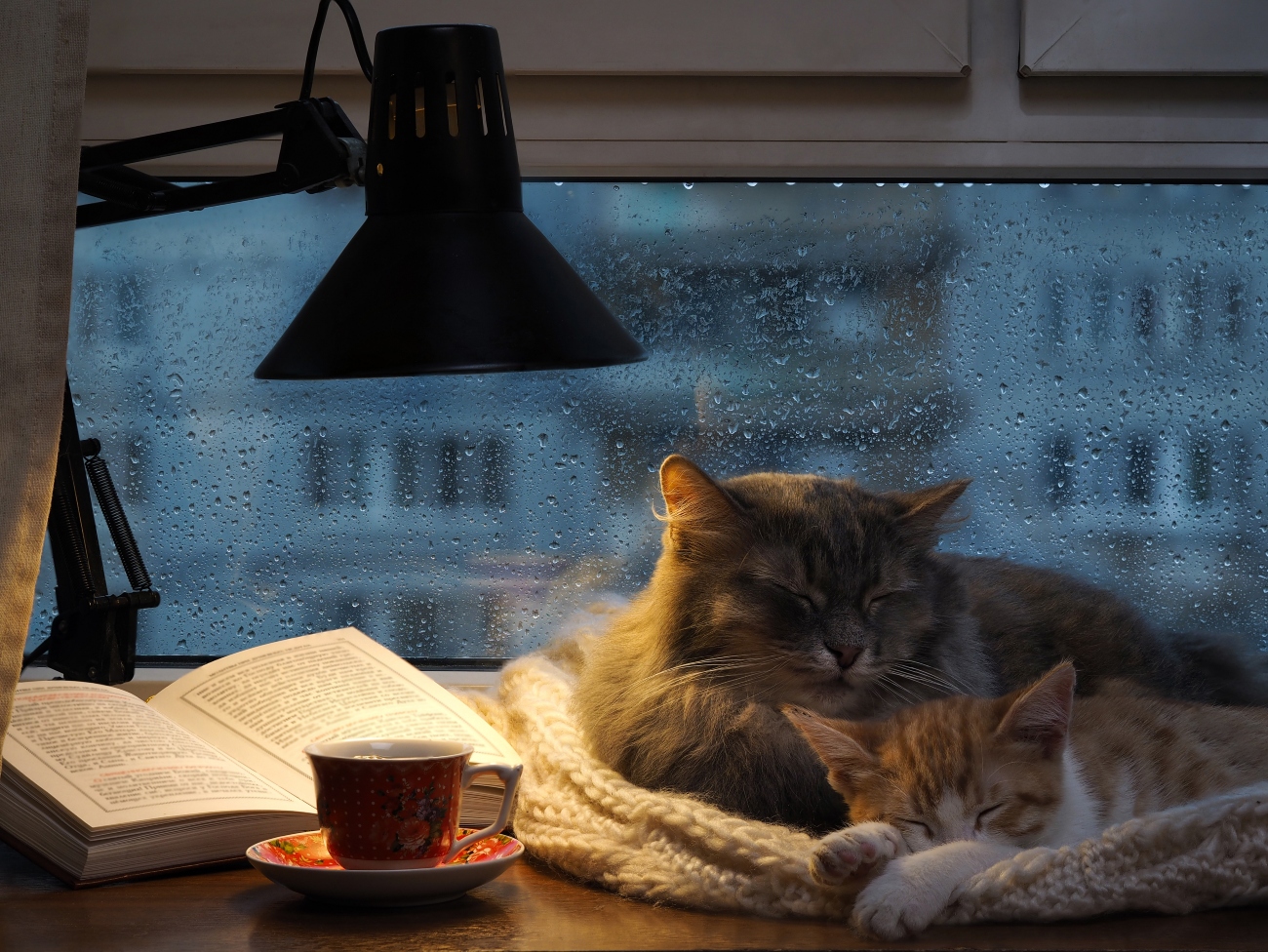
You’ve read how incredible a cats’ sight is and know how important it is to help them navigate the world. As a responsible pet parent, it’s your job to look out for your pet and watch for signs that something is wrong so you can get them emergency care.
Don’t worry – you don’t need to do it alone. At Purely Pets, your feline friend is just as important to us as it is to you, which is why we offer 15 levels of cat health insurance for you to find the right cover for your pet.
Whether you need urgent care fast or are looking for quick advice over a video chat, our award-winning pet insurance is here to help keep your feisty feline in tip-top shape.
Don’t wait any longer to give your pet the protection they deserve. To cover your kitty with cat health insurance, call Purely Pets today for a quick quote.
Helpful Pages
Recent Posts
Pet Insurance Quote
- 98% claims paid *
- Claims paid directly to vets
- 24/7 vet video consultations
- Interest free monthly payments
